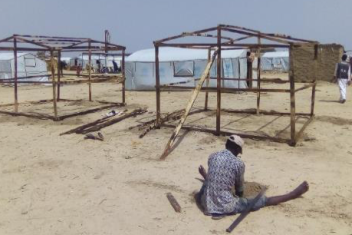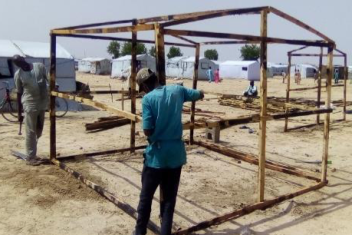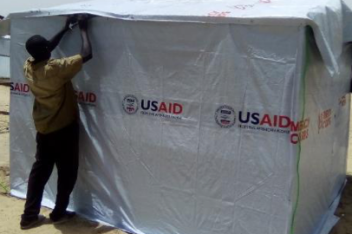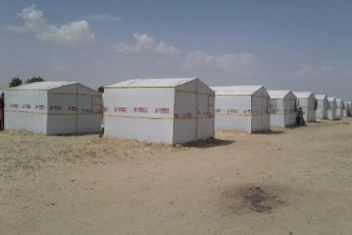OFDA program constructs 600 shelters for displaced families
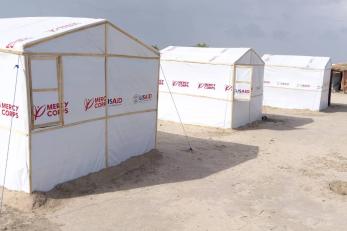
One of the devastating impacts of the ongoing conflict in Northeast Nigeria caused by insurgency and increasing security is the issue of displacement and homelessness faced by vulnerable communities, most especially in Borno state. Despite dedicated government military action and international support to curb the conflict and stop the ensuing humanitarian crisis, there continues to be repeated attacks by insurgents, of which recent attacks have caused an influx of displaced persons to Internally Displaced People (IDP) camps and neighboring communities.
Mercy Corps Nigeria through its USAID Office of US Foreign Disaster Assistance (OFDA) funded program is providing response to the issue by constructing temporary shelters for displaced families who arrived Ngala, Borno state from neighboring communities along the Chad Basin. Our field team attending to IDPs in Arabic Camp, Ngala say the influx of new arrivals is happening at an alarming rate. However, irrespective of their place of displacement, the families were accommodated at the Arabic camp reception centre in Ngala managed by INTERSOS Camp Coordination and Camp Management (CCCM). The reception centre is a building facility consisting of emergency stations prepared for IDPs.
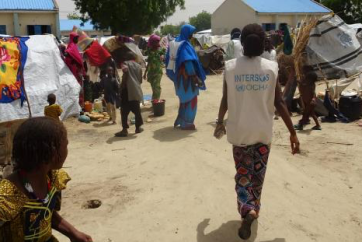
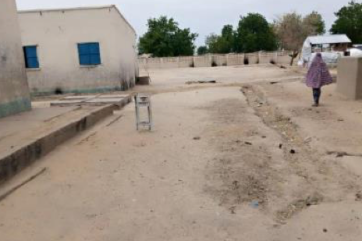
With the increase in daily influx, the facilities at the reception center became overstretched; forcing IDPs to take refuge in makeshift shelters, with some having to sleep under the open to sky within the reception premises. The deplorable and undignified situation of the affected communities necessitated the need for Mercy Corps to construct 600 units of enhanced emergency shelters to meet their life-saving shelter needs through the OFDA 3 funded shelter program. With the construction of these shelters, program participants were provided to a more dignified, safer, adaptable shelter that offers them privacy. It also minimizes potential threat to gender based violence, fire and infectious diseases that could arise from living in crowded conditions.
The reception center that was originally designed to accommodate 105 households making 500 individuals was accommodating 6242 individuals at a time when Mercy Corps conducted an assessment in November 2019. At the time of our intervention 1,646 households at the reception needed shelter, in addition to their needs for food, water and hygiene assistance. Mercy Corps kicked off work to provide assistance, alongside other humanitarian partners to provide 557 households (1965 Individuals) with 600 emergency shelters, which has significantly reduced congestion at the reception center.
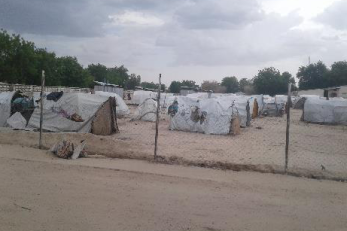
The process
To ensure ownership of the shelters and support from the hosting Ngala community, Mercy Corps carried out a series of stakeholder discussion and facilitation to ensure their support and IDPs involvement in the process. INTERSOS, the coordinating agency provided a participant list to Mercy Corps after holding collaborative meetings. Due to challenges of finding adequate space for the shelter construction, numerous collaboration meetings were held between Mercy Corps and other partner agencies inclusive of IOM and INTERSOS to carry out a joint technical assessment to agree on construction plans.
Upon approval of the site plans, Mercy Corps procured the shelter materials and treated the timber to be used to construct the shelters. We recruited and provided training for team members who supervised the expert construction of the materials, ensuring compliance in quality of workmanship, code of conduct, shelter construction guideline on COVID-19, shelter materials quality specifications, quantity and cost.
To further boost the sense of ownership of our program participants who were going to stay in the shelters, we sensitized them on general enhanced emergency shelter construction approach to help them understand the process; while some of them supported by providing unskilled labor during the construction.
A new ray of hope for displaced families
Yagana Adam is a 30-year-old wife and mother with 3 children, who has been at the reception centre from 10 months. Armed Opposition Group attacked her village called Bularam in Bulangwa ward, a border community bordering Chad. In her own words, “I am so happy to finally enjoy the privacy of a home with my family unlike the previously congested living conditions at the reception centre.”
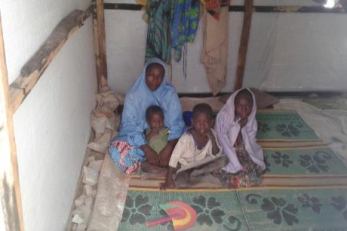
Hafsat Hasana is a 45-year-old widow who has a teenage son. They lived in a border village called Garal, about 20 km from Ngala town before being displaced by Armed Opposition Groups three years ago where they stayed near Cameroon for 2 more years and then arrived the reception centre 7 months ago. Hafsat says she is relieved and happy that she and her family now have their own space. In her words, “I am finally happy to live in a community with people I knew before being displaced, who I did not know were here because of how congested we were at the reception centre.”
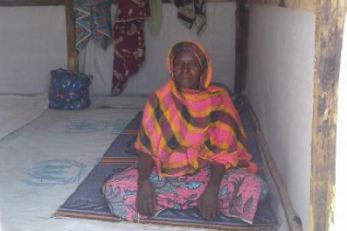
About Mercy Corps Nigeria OFDA program
Mercy Corps Nigeria USAID Office of US Foreign Disaster Assistance (OFDA) funded program provides emergency aid that primarily focuses on responding to immediate humanitarian needs; especially those faced by new arrivals and people living in overcrowded and underserved camps and host communities in Borno state. Through this program, Mercy Corps targets the substantial, unmet needs of the most vulnerable communities in Damboa, Dikwa, Gwoza, and Ngala Local Government Areas (LGAs) of Borno state.
